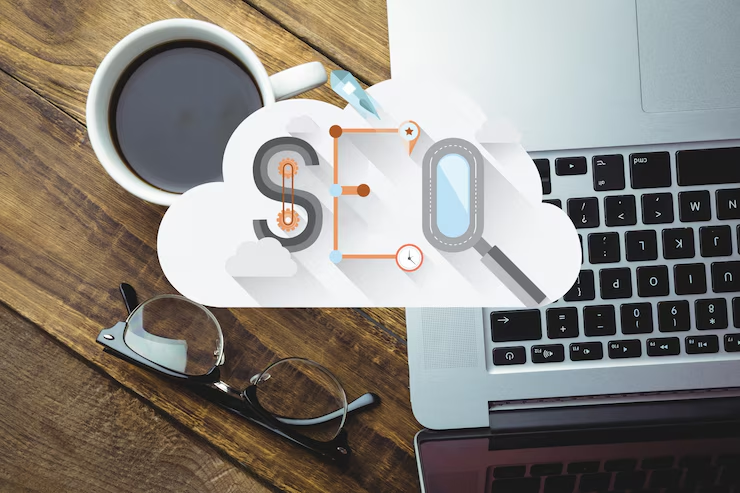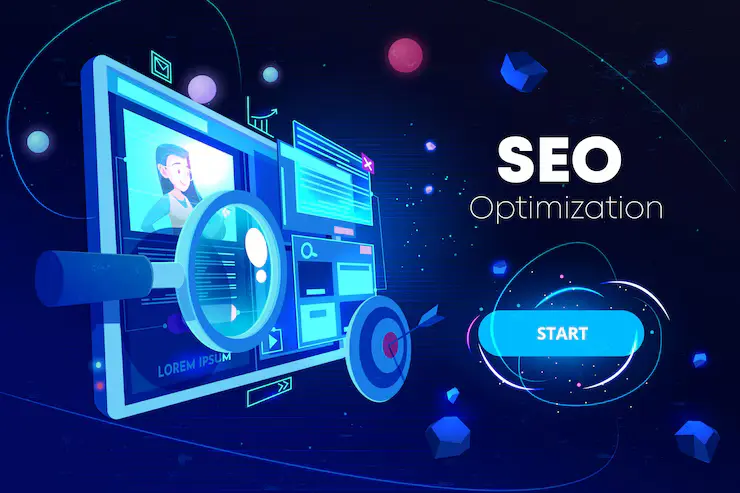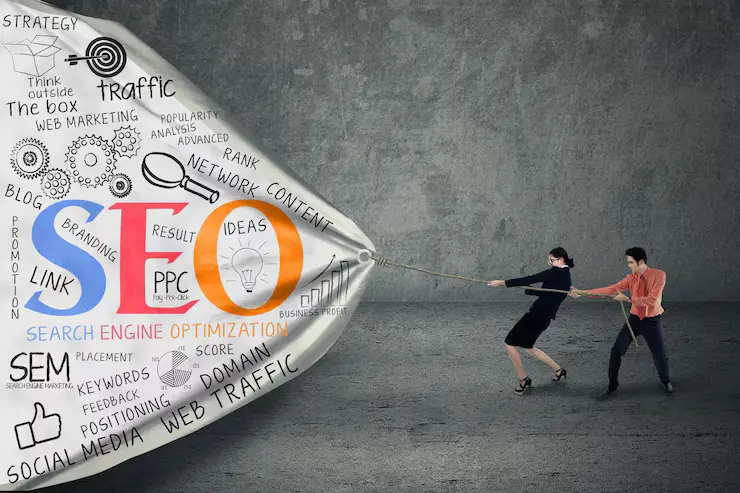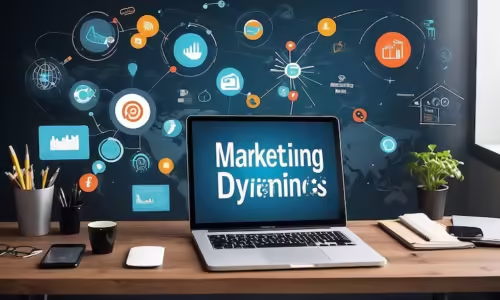- aumdigitech
- 0 Comments
- 236 Views
Table of Contents
Introduction
For digital marketing to be efficient, it is essential to comprehend the workings of PPC (pay per click) and SEO (search engine optimisation). Think of SEO and PPC as the vital nutrients that help your online presence thrive, like a flourishing garden. As the leading digital marketing company in Mumbai, Aum Digitech recognizes the significance of comprehending these strategies.
SEO, like tending to the soil, involves optimizing your online content through techniques such as on-page SEO, off-page SEO, and local SEO, ensuring search engines recognize and prioritize your website. On the other hand, PPC, akin to strategically planting seeds, involves managing campaigns through PPC campaign management and utilizing Cost-per-Click (CPC) advertising, ensuring your business appears prominently when users search.
Understanding the benefits of PPC advertising, such as targeted exposure, complements the long-term benefits of SEO. Together, they create a harmonious blend, propelling your digital garden to new heights. As a go-to digital marketing services provider in Thane and one of the best digital marketing agencies, Aum Digitech is committed to nurturing your online presence with precision, offering a holistic approach that includes SEO for small businesses and comprehensive PPC strategies. Dive into the world of digital marketing with us, where the synergy of SEO and PPC cultivates a flourishing online ecosystem for your business.
What is SEO?
Definition and Significance of SEO in Online Visibility:
SEO, or Search Engine Optimization, acts as the digital gardener’s essential toolkit for cultivating a thriving online presence. In the vast landscape of digital marketing, SEO is the compass guiding websites to visibility on search engines like Google. The significance of SEO lies in its ability to enhance a website’s ranking, thereby increasing organic traffic and attracting more website visitors. Think of it as the magic behind why certain websites appear at the top of search results. As the leading digital marketing company in Mumbai, we understand that a well-optimized website becomes the beacon in the digital jungle, drawing users to explore the valuable content it offers. In essence, SEO is the cornerstone for businesses aiming to improve website ranking, increase organic traffic, and achieve a robust online presence.

Basic SEO Terms Explained:
Keywords and Their Role:
Keywords are the seeds sown in the digital soil; they are the words and phrases users input into search engines. Understanding and strategically incorporating relevant keywords in website content is crucial for SEO success. As the digital gardener, you want your website to blossom for queries related to your business. The art lies in using white hat SEO techniques, ethical practices that align with search engine guidelines, to organically infuse keywords, ensuring your website gets discovered by those seeking information or products in your domain.
On-Page and Off-Page Optimization:
On-page optimization involves tending to the content and structure of your website. It’s like planting the right seeds in fertile soil. This includes optimizing titles, headings, and meta descriptions. Off-page optimization, on the other hand, involves activities outside your website, such as building quality backlinks. It’s the ecosystem that surrounds your digital garden. Both on-page and off-page efforts contribute to the overall health of your website in the digital realm.
Backlinks and Their Impact:
Backlinks are akin to endorsements from other gardens in the digital neighborhood. They are links from external websites pointing to your content. The more quality backlinks your website has, the more authority it gains in the eyes of search engines. However, it’s crucial to focus on acquiring backlinks through white hat SEO techniques rather than resorting to shortcuts like black hat SEO techniques, which can lead to penalties. A healthy backlink profile is the secret ingredient for elevating your website’s credibility and visibility.

What is PPC (Pay-Per-Click)
Definition and How PPC Complements SEO:
PPC, or Pay-Per-Click, is the agile sprinter in the digital marketing race, providing businesses with swift visibility. It acts as a shortcut through the digital jungle, where advertisers pay a fee for each click on their ad. While SEO is the patient gardener cultivating organic growth over time, PPC offers immediate results by placing ads at the top of search engine results. As the leading digital marketing company in Mumbai, we recognize the symbiotic relationship between PPC and SEO. PPC complements SEO by offering a strategic shortcut to visibility, providing instant results while SEO efforts take root and grow organically. Together, they form a dynamic duo, enhancing a website’s overall presence and ensuring businesses capture attention both instantly and over the long term.

Key PPC Terms Demystified:
Ad Impressions and Click-Through Rate (CTR):
Ad impressions represent the number of times your ad is displayed, while Click-Through Rate (CTR) is the percentage of users who click on your ad after seeing it. Ad impressions serve as visibility opportunities, and a high CTR signifies an effective ad that captures audience interest. Effective management of ad impressions and CTR is crucial in PPC campaign management to optimize performance and maximize return on investment (ROI).
Quality Score and Its Relevance:
Quality Score, assigned by platforms like Google, evaluates the relevance and quality of your keywords, ads, and landing pages. It acts as a digital report card, influencing ad placement and costs. Maintaining a high Quality Score is imperative for businesses, impacting the efficiency and effectiveness of PPC campaigns. As a digital marketing services provider in Thane, we prioritize strategies that enhance Quality Scores, ensuring optimal performance.
Bid Management and Budgeting:
Bid management involves strategically setting the maximum amount you’re willing to pay for a click on your ad. It’s akin to placing a strategic bet in the digital auction. Budgeting is the overall amount allocated to your PPC campaign. Effective bid management and budgeting are critical PPC campaign optimization techniques to ensure efficient spending while maximizing visibility. Our expertise lies in crafting strategic bids and budgets tailored to the goals of our clients.

SEO vs. PPC: Understanding the Differences
Pros and Cons of SEO and PPC:
SEO’s Organic Growth:
SEO, symbolizing the diligent gardener in the digital landscape, excels in organic growth, offering sustained visibility over time. Representing the essence of the digital soil, SEO’s strengths lie in delivering long-term results, cost-effectiveness, and establishing credibility for businesses. However, its cons include the time required for results to manifest and the unpredictability of ranking fluctuations. Aum Digitech, recognized as the leading digital marketing company in Mumbai, adeptly navigates these nuances, crafting SEO strategies that cultivate lasting online visibility while addressing potential challenges.
PPC’s Swift Visibility:
PPC, akin to the swift sprinter in the digital realm, provides businesses with immediate visibility and high controllability. Serving as the quick solution for targeted exposure, PPC’s pros include rapid results, precise targeting, and measurable ROI. However, it comes with ongoing costs and the potential challenge of click fraud. As a seasoned PPC campaign management company in Mumbai, Aum Digitech strategically maneuvers through these intricacies, leveraging the immediacy of PPC alongside the organic growth of SEO. This dynamic approach ensures businesses achieve a well-rounded and effective digital marketing strategy, combining the strengths of both SEO and PPC.
When to Use SEO and When to Opt for PPC:
Cost Considerations:
SEO is like planting seeds that grow over time, offering cost-effectiveness in the long run. For businesses with budget constraints but seeking sustained visibility, SEO is the strategic choice. PPC, on the other hand, requires a budget for every click but provides immediate visibility. It’s the go-to choice for businesses seeking quick results and having the budget for ongoing campaigns. Aum Digitech, as a PPC campaign management company in Mumbai, understands the delicate balance between cost considerations and marketing goals, offering tailored solutions.
Long-term vs. Short-term Results:
SEO is the marathon runner, steadily building momentum for lasting success. It’s ideal for businesses with a long-term vision, seeking to establish authority and credibility. On the flip side, PPC is the sprinter, delivering instant results suitable for short-term campaigns or promotions. Businesses looking for quick wins, seasonal promotions, or immediate visibility often opt for PPC. Aum Digitech, as the best SEO marketing agency in Mumbai, and an expert in PPC, provides a strategic blend, ensuring businesses reap the benefits of both short-term and long-term digital marketing initiatives.
The Symbiotic Relationship: Integrating SEO and PPC
How SEO and PPC Can Work Together Synergistically:
SEO and PPC, often viewed as separate entities, can form a symbiotic relationship when strategically integrated. SEO, the steady gardener, establishes a foundation for organic growth, while PPC, the swift sprinter, provides immediate visibility. By strategically aligning keyword strategies, businesses can create a holistic digital marketing approach. For instance, PPC campaigns can identify high-converting keywords, which can then be incorporated into the SEO strategy for long-term benefits. Additionally, SEO can help optimize landing pages, improving the Quality Score for PPC ads. This synergy maximizes visibility on search engine results pages (SERPs), creating a more comprehensive and effective digital presence. As the leading digital marketing company in Mumbai, Aum Digitech specializes in this integrated approach, ensuring businesses harness the strengths of both SEO and PPC for optimal results.
Case Studies Illustrating Successful Integration:
In real-world scenarios, businesses that seamlessly integrate SEO and PPC often experience amplified results. For example, a local business focusing on SEO for small businesses can use PPC to target specific services or promotions, ensuring immediate visibility to the local audience. This dual strategy increases overall visibility, with SEO providing sustained growth and PPC offering quick wins. Another case could involve optimizing landing pages through SEO practices, subsequently enhancing the performance of PPC campaigns. These case studies showcase the power of combining both strategies to achieve a well-rounded and impactful digital marketing strategy. Aum Digitech, as a seasoned PPC campaign management company in Mumbai, draws inspiration from such success stories, crafting customized approaches that reflect the synergy between SEO and PPC, ultimately driving superior results for businesses.
A Few Facts About Digital Marketing
Addressing Prevalent Myths about SEO and PPC:
In the dynamic world of digital marketing, myths surrounding SEO and PPC often cloud decision-making. Contrary to misconceptions, SEO for small businesses is not an exclusive playground for large enterprises. Local businesses, too, can thrive by implementing strategies like local SEO, which tailors content to regional audiences. Another common fallacy suggests that SEO and PPC are mutually exclusive, but, in reality, they can form a powerful alliance. By strategically combining efforts like on-page SEO, off-page SEO, and technical SEO with targeted PPC campaigns, businesses can achieve a harmonious online presence. As the leading digital marketing company in Mumbai, Aum Digitech debunked these myths, emphasizing that a holistic approach, blending SEO and PPC, offers the most effective strategy for businesses of all sizes.
Clarifying Misunderstandings for Better Decision-Making:
Misunderstandings often surround the realm of PPC, specifically regarding the perceived high costs of Cost-per-Click (CPC) advertising. While PPC involves expenses, its benefits, including quick results, precise targeting, and measurable ROI, often outweigh the costs. Additionally, concerns about the effectiveness of PPC ad copywriting are dispelled by successful case studies. As a trusted PPC campaign management company in Mumbai, Aum Digitech illustrates how strategic ad copywriting contributes to compelling campaigns, driving businesses towards their goals. By clarifying these misunderstandings, Aum Digitech ensures that businesses make informed decisions, embracing the full potential of digital marketing for sustainable success.
Conclusion:
In conclusion, comprehending the intricacies of SEO and PPC is akin to unlocking the doors to a world of digital opportunities. As the landscape of online visibility evolves, businesses must grasp the profound impact of these strategies. SEO, resembling the nurturing gardener, ensures sustained growth and credibility, while PPC, the swift sprinter, offers immediate visibility and controllability.
Together, they create a symbiotic relationship, a dynamic duo that propels businesses to new heights. Aum Digitech, standing as the leading digital marketing company in Mumbai and a distinguished digital marketing services provider in Thane, advocates for a holistic approach. By embracing the nuances of PPC campaign management and Cost-per-Click (CPC) advertising, businesses can harness the benefits of both worlds. It’s not just about digital marketing; it’s about crafting a tailored strategy, incorporating elements like SEO for small businesses, local SEO, and strategic keyword research for SEO.
As businesses embark on this digital journey, understanding these nuances becomes pivotal for enhanced online success. Aum Digitech encourages businesses to delve into the world of digital marketing terminology, where the right knowledge is the key to unlocking unparalleled growth and visibility in the digital realm.
FAQ
What is PPC and SEO in digital marketing?
PPC (Pay-Per-Click): A digital marketing model where advertisers pay a fee each time their ad is clicked. It offers immediate visibility through paid placements on search engine results or other online platforms.
SEO (Search Engine Optimization): A set of strategies aimed at optimizing a website to improve its visibility on search engine results organically. It involves techniques like keyword optimization, content creation, and backlink building.
Key differences between SEO and PPC and which is more effective for long-term growth?
Differences: Cost: PPC involves paid advertising, while SEO is organic and generally incurs lower ongoing costs.
Speed: PPC provides immediate results, while SEO requires time to build organic visibility.
Sustainability: PPC visibility stops when the budget ends, while SEO provides sustained visibility.
Effectiveness for Long-Term Growth: Both SEO and PPC play crucial roles. SEO is more effective for long-term, sustainable growth, building credibility over time. PPC is ideal for quick results and targeted campaigns. A balanced approach, leveraging both, is often the most effective.
What are the 7 C’s of digital marketing?
1. Content: Creating valuable and relevant content.
2. Context: Understanding the audience and delivering content in the right context.
3. Connection: Building meaningful connections with the audience.
4. Community: Fostering a community around the brand.
5. Customization: Tailoring marketing efforts to individual preferences.
6. Communication: Effective communication with the audience.
7. Conversion: Guiding users toward desired actions.
What are the 5 R’s of digital marketing?
1.Reach: Expanding brand visibility to a wider audience.
2. Relevance: Delivering content and messages that are pertinent to the audience.
3. Resonance: Creating a connection that resonates with the audience emotionally.
4. Reaction: Encouraging a response or engagement from the audience.
5. Return on Investment (ROI): Evaluating the effectiveness of digital marketing efforts in terms of the return on investment.








